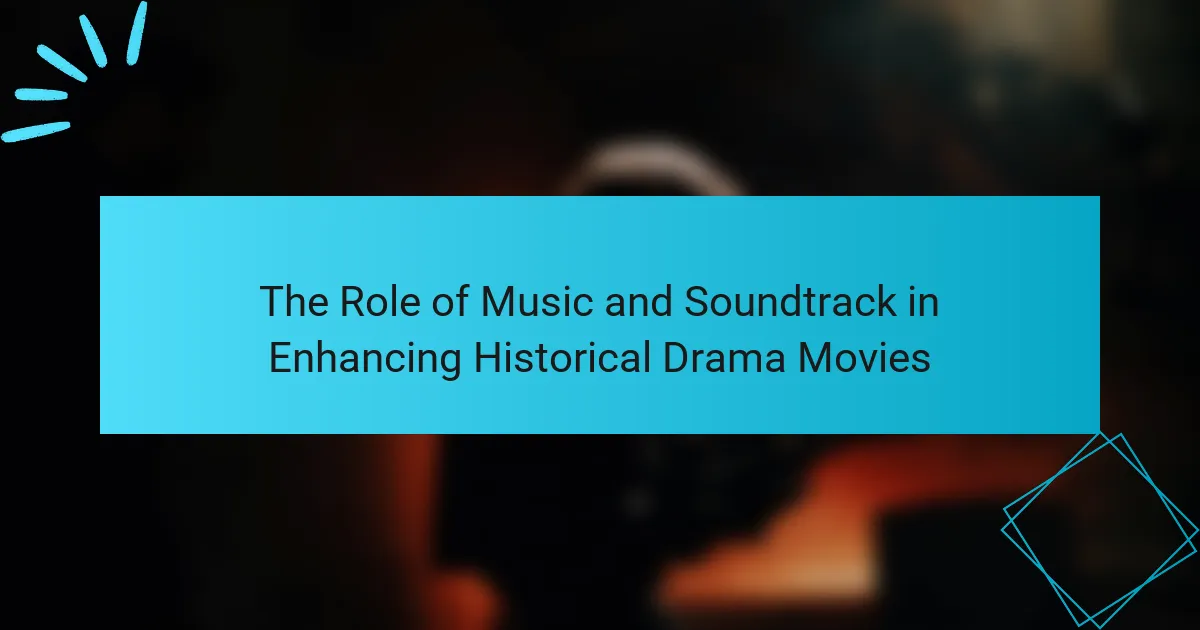
What is the role of music and soundtrack in enhancing historical drama movies?
Music and soundtrack play a crucial role in enhancing historical drama movies. They establish the emotional tone and atmosphere of the film. Music helps to immerse the audience in the time period being depicted. Soundtracks can evoke specific cultural contexts relevant to the historical setting. For example, traditional instruments may be used to represent the era accurately. The score can heighten tension during pivotal scenes, increasing viewer engagement. Additionally, music can underscore character development and relationships. Research shows that films with effective soundtracks often receive higher audience ratings. This demonstrates the significant impact of music on the overall cinematic experience.
How does music influence the emotional impact of historical drama films?
Music significantly influences the emotional impact of historical drama films by enhancing the storytelling experience. It sets the mood and tone, guiding audience emotions throughout the narrative. For example, a somber score can evoke feelings of sadness during tragic events. Conversely, uplifting music can create a sense of hope or triumph.
Research indicates that music activates the brain’s emotional centers, making scenes more memorable. A study published in the Journal of Film Music found that audiences rated emotional scenes higher when accompanied by music. Additionally, specific musical themes can represent characters or ideas, creating a deeper connection for viewers.
Overall, music serves as a powerful tool in historical dramas, shaping audience perceptions and emotional responses.
What types of music are commonly used in historical dramas?
Historical dramas commonly use orchestral music, folk music, and period-specific compositions. Orchestral music enhances emotional depth and grandeur. Folk music often reflects the cultural background of the setting. Period-specific compositions provide authenticity to the time depicted. These music types create an immersive experience for the audience. They help convey the narrative and emotional tone effectively. Historical accuracy in music selection supports the storytelling. This practice is evident in films like “The Last of the Mohicans” and “Pride and Prejudice.”
How do soundtracks set the tone for historical narratives?
Soundtracks set the tone for historical narratives by evoking specific emotions and creating an immersive atmosphere. Music influences audience perceptions of time, place, and character. For instance, orchestral scores often suggest grandeur or tragedy, while folk music can evoke authenticity and cultural context. Historical events portrayed in films, such as “Schindler’s List,” utilize haunting melodies to reflect the gravity of the subject matter. Additionally, soundtracks can accentuate dramatic moments, enhancing tension or relief. By integrating period-specific music, filmmakers reinforce the authenticity of the narrative. Studies show that emotional responses to music can significantly affect viewer engagement and memory retention.
Why is the soundtrack crucial for historical accuracy and immersion?
The soundtrack is crucial for historical accuracy and immersion because it enhances the authenticity of the depicted era. Music reflects the cultural, social, and emotional contexts of a specific time period. For instance, using period-specific instruments and styles can accurately represent the historical setting. This accuracy helps audiences feel connected to the narrative and characters. Additionally, soundtracks can evoke emotions that align with the historical events portrayed. Research shows that music influences viewer perception and memory of historical content. A well-crafted soundtrack can transport viewers into the past, making the experience more engaging and immersive.
How does music help in portraying the cultural context of a specific era?
Music serves as a powerful tool in portraying the cultural context of a specific era. It reflects the social, political, and emotional landscape of the time. Different musical styles and genres emerge in response to historical events and cultural shifts. For example, jazz music in the 1920s symbolized the spirit of rebellion and change during the Roaring Twenties. Similarly, folk music often embodies the struggles and aspirations of a community during times of conflict or social change. Historical drama movies utilize music to evoke the appropriate emotional response from the audience. Soundtracks are carefully curated to match the time period, enhancing authenticity. Music can also include traditional instruments unique to a culture, further grounding the audience in the era depicted. Overall, music encapsulates the essence of an era, making it an essential element in historical storytelling.
What role do sound effects play in enhancing the historical setting?
Sound effects play a crucial role in enhancing the historical setting of films. They create an immersive atmosphere that reflects the time period and location. Authentic sound effects, such as horse hooves, battle noises, or ambient environment sounds, transport viewers to a specific historical context. They help establish the mood and emotional tone of scenes. For example, the sound of a blacksmith’s hammer can evoke the industrial age. Additionally, sound effects can reinforce the narrative by providing auditory cues that complement visual storytelling. Historical accuracy in sound effects is essential for audience engagement and believability. Overall, well-crafted sound effects significantly contribute to the authenticity and richness of a historical drama.

How do composers create soundtracks for historical drama movies?
Composers create soundtracks for historical drama movies by carefully researching the time period and cultural context. They analyze historical events, social norms, and popular music styles of the era. This research informs their choice of instruments, melodies, and harmonies. Composers often incorporate traditional instruments to enhance authenticity. They may also collaborate with historians or cultural experts for accuracy. The emotional tone of the film guides the musical style chosen. Composers aim to evoke specific feelings that align with the narrative. The soundtrack is designed to complement key scenes and character development. This approach ensures the music enhances the overall storytelling experience.
What processes do composers follow to develop a fitting score?
Composers follow several key processes to develop a fitting score. First, they analyze the script and characters. This helps them understand the emotional tone and themes. Next, they create thematic motifs for characters or events. These motifs serve as musical identities throughout the score.
Then, composers often collaborate with directors. This collaboration ensures that the music aligns with the film’s vision. Additionally, they may conduct research on historical context. Understanding the period can influence musical choices.
Once these steps are completed, composers begin the composition process. They sketch ideas and develop them into full pieces. Finally, they orchestrate the score for various instruments. This final step brings the music to life in the film.
How do composers research historical contexts to inform their music choices?
Composers research historical contexts by examining primary sources, such as letters, diaries, and historical documents. They analyze the cultural, social, and political climates of the time period. This research helps them understand the emotions and themes relevant to the era. Composers also study existing music from the period to capture authentic sounds. They may consult historians and experts for deeper insights. Additionally, they attend lectures or workshops focused on historical musicology. This comprehensive approach ensures that their compositions resonate with the intended historical narrative. By grounding their work in accurate historical contexts, composers enhance the authenticity of historical drama movies.
What instruments are typically featured in historical drama soundtracks?
Historical drama soundtracks typically feature orchestral instruments. Strings, such as violins and cellos, create emotional depth. Woodwinds, like flutes and clarinets, add texture and atmosphere. Brass instruments, including trumpets and French horns, contribute to grandeur and intensity. Percussion, such as timpani and snare drums, enhances dramatic moments. Traditional instruments, like lutes and harpsichords, evoke specific historical contexts. These instruments collectively help transport the audience to the time period depicted in the drama.
How do directors and producers collaborate with composers?
Directors and producers collaborate with composers by clearly communicating the vision for the film’s music. They discuss the emotional tone and themes that the score should convey. This collaboration often begins in pre-production, where initial ideas are shared. Directors provide context on scenes that require specific musical cues. Producers may also influence the budget and timeline for music creation. Composers often present drafts and revisions based on feedback. This iterative process helps ensure the music aligns with the film’s narrative. Successful collaborations can significantly enhance the storytelling in historical drama movies.
What factors do directors consider when selecting music for their films?
Directors consider several factors when selecting music for their films. The emotional tone of the scene is crucial. Music must align with the intended mood to enhance storytelling. The historical context also plays a significant role. Directors often seek music that reflects the time period accurately. Character development influences music choices as well. Themes associated with characters can be reinforced through specific musical motifs. Audience engagement is another factor. Music can evoke specific reactions, keeping viewers invested. Finally, budget constraints impact music selection. Directors must balance artistic vision with financial limitations.
How can the vision of a director shape the soundtrack’s direction?
The vision of a director can significantly shape the soundtrack’s direction by establishing the emotional tone and narrative style of a film. Directors often communicate their artistic intentions through discussions with composers and sound designers. This collaboration ensures that the music aligns with the visual storytelling. For instance, a director may prefer a minimalist score to evoke subtle emotions or a grand orchestral arrangement to enhance epic moments. Historical context also influences this vision, as directors may seek authentic period instruments or styles to reflect the time setting. The director’s vision ultimately guides the creative choices made in the soundtrack, ensuring it complements the overall cinematic experience.

What are some notable examples of effective soundtracks in historical dramas?
Notable examples of effective soundtracks in historical dramas include “Gladiator,” composed by Hans Zimmer. This soundtrack enhances the film’s epic narrative and emotional depth. Another example is “The Last of the Mohicans,” featuring music by Trevor Jones and Randy Edelman. Its score is integral to the film’s atmosphere and storytelling. “Schindler’s List,” with music by John Williams, profoundly impacts the emotional weight of the film. The haunting violin solos underscore the tragedy depicted in the story. “Dunkirk,” composed by Hans Zimmer, uses innovative sound design to create tension and urgency. Each of these soundtracks significantly contributes to the films’ historical context and viewer experience.
Which historical drama films are renowned for their music and soundtracks?
“Gladiator,” “The Last of the Mohicans,” and “Schindler’s List” are renowned historical drama films known for their music and soundtracks. “Gladiator,” composed by Hans Zimmer, features a powerful score that enhances its epic narrative. “The Last of the Mohicans,” with music by Trevor Jones and Randy Edelman, is celebrated for its emotional themes and orchestration. “Schindler’s List,” composed by John Williams, is recognized for its haunting violin solos that underscore the film’s poignant moments. Each of these films uses music to deepen the emotional impact and historical context of their stories.
What specific elements made these soundtracks stand out?
The specific elements that made these soundtracks stand out include their emotional depth and cultural authenticity. Emotional depth is achieved through the use of orchestration that evokes powerful feelings. For example, sweeping strings can create a sense of longing or nostalgia. Cultural authenticity is established by incorporating traditional instruments and musical styles relevant to the historical context. This connection enhances the viewer’s immersion in the time period. Additionally, the use of motifs associated with characters or themes adds layers of meaning. Such motifs can signal character development or foreshadow events. These elements combined create a memorable auditory experience that complements the visual storytelling.
How did the music enhance the storytelling in these films?
Music enhanced storytelling in historical drama films by creating emotional depth. It set the tone and atmosphere, guiding audience reactions. For example, soaring orchestral scores evoke feelings of triumph or sorrow. Specific motifs can represent characters, enhancing their development. Historical accuracy in music also grounds the narrative in its time period. This connection helps viewers engage with the story more profoundly. Studies show that music significantly influences audience perception and memory. Thus, music is crucial in conveying themes and emotions in historical dramas.
What lessons can filmmakers learn from successful historical drama soundtracks?
Successful historical drama soundtracks teach filmmakers the importance of authenticity and emotional resonance. Authenticity in music helps to immerse the audience in the historical period. For example, using period-specific instruments can enhance the overall experience. Emotional resonance ensures that the soundtrack aligns with character arcs and pivotal moments. This connection can significantly amplify the narrative impact. Additionally, successful soundtracks often incorporate motifs that represent characters or themes. This technique helps to create continuity throughout the film. Filmmakers can also learn the value of silence and minimalism. Strategic use of silence can heighten tension and focus attention on dialogue. Overall, these lessons emphasize the soundtrack’s role in storytelling and audience engagement.
What best practices should filmmakers consider when choosing music for historical dramas?
Filmmakers should prioritize authenticity when choosing music for historical dramas. This involves selecting music that reflects the time period and cultural context of the story. Research indicates that historically accurate music enhances viewer immersion and emotional engagement. Filmmakers should also consider the emotional tone of scenes. Music should complement the narrative and support character development. Collaborating with music historians can provide valuable insights into appropriate choices. Additionally, filmmakers should explore a mix of original compositions and existing historical pieces. This approach can create a unique soundscape while maintaining authenticity. Finally, testing music with focus groups can gauge audience reactions and ensure effectiveness.
How can emerging filmmakers effectively utilize music to enhance their narratives?
Emerging filmmakers can effectively utilize music to enhance their narratives by carefully selecting scores that align with the emotional tone of their scenes. Music can evoke specific feelings, making moments more impactful. For instance, a dramatic score can heighten tension during a conflict scene. Conversely, a soft melody can create intimacy in a romantic moment.
Additionally, thematic motifs can be introduced to represent characters or ideas, allowing audiences to connect more deeply with the story. Historical accuracy in music selection can also immerse viewers in the time period being portrayed. Studies show that soundtracks influence audience perception and memory of scenes. According to a study by the University of Southern California, music significantly affects emotional responses in film.
By integrating these techniques, filmmakers can create a more engaging and memorable narrative experience.
The main entity of the article is the role of music and soundtrack in enhancing historical drama movies. The article examines how music establishes emotional tone, immerses audiences in historical contexts, and influences viewer engagement and memory. It discusses the types of music commonly used, the importance of sound effects, and the processes composers follow to create authentic soundtracks. Additionally, it highlights notable examples of effective soundtracks and offers best practices for filmmakers to enhance their narratives through music.
